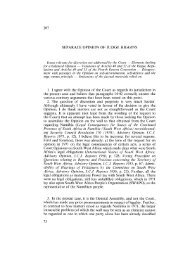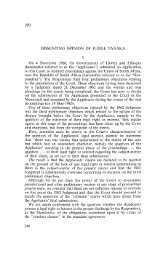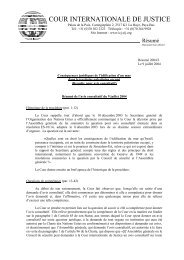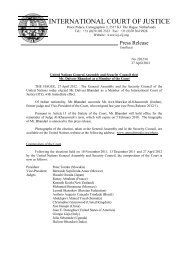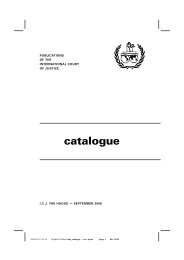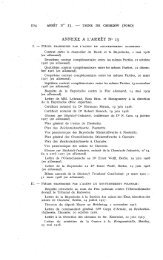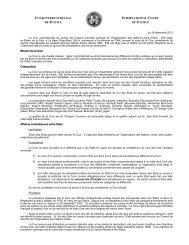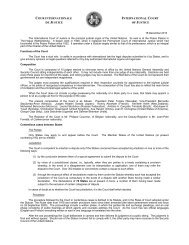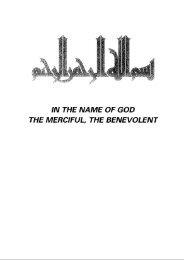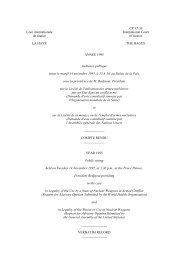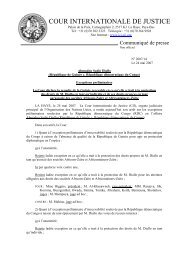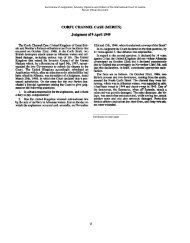botswana/namibia - Cour international de Justice
botswana/namibia - Cour international de Justice
botswana/namibia - Cour international de Justice
You also want an ePaper? Increase the reach of your titles
YUMPU automatically turns print PDFs into web optimized ePapers that Google loves.
The Report discloses that while the main channel of the Chobe River is shown on maps as<br />
passing to the South of Kasikili Island it in fact passes to the North of that Island.<br />
It has been confirmed, as a result of exhaustive enquiries, that there has been no shifting of the<br />
main channel of the river from South to North within living memory. The facts, therefore,<br />
point to the maps being incorrect." (Botswana, Memorial, Annex 23).<br />
47. On the basis of the maintenance of the legal status quo, the two Governments agreed upon<br />
a modus vivendi involving practical arrangements locally: see below, Chapter 3, paras. 167-<br />
71. At no stage did any South African official challenge the view that the northern channel<br />
constituted the main channel for the purposes of the Anglo-German Agreement. Thus, in its<br />
letter dated 10 May 1951 (Botswana Memorial, Annex 30), the British Government stated that<br />
'it is assumed that the free use of the main channel of the Chobe, to the north of the Island,<br />
would continue to be assured un<strong>de</strong>r the <strong>international</strong> rules governing waterways that form the<br />
common boundary of two States.' (emphasis supplied). This characterisation was not<br />
challenged by South Africa.<br />
48. When the agreement reached between the two Governments was referred to the local<br />
administrators for action, further correspon<strong>de</strong>nce ensued between Major Trollope (in the<br />
Eastern Caprivi) and Mr. V.E. Dickinson, Acting District Commissioner (at Kasane). It is<br />
relevant to note that during these exchanges Major Trollope emphasised that, prior to the<br />
application of Mr. Ker relating to transport of timber, there had been no previous dispute.<br />
49. Thus, in his letter to Dickinson dated 4 August 1951, Trollope observed:<br />
"3. In all the years past there have never been any difficulties - in<strong>de</strong>ed even the question of the<br />
use of the "Northern Waterway" was never a real issue. Not a single boat, craft or person was<br />
ever hin<strong>de</strong>red in its use. Even the redoubtable W.C. Ker used it the whole time he ran service<br />
to Siron<strong>de</strong>llas without any let or hindrance at all. But that loquacious and ten<strong>de</strong>ntious<br />
gentleman was never satisfied unless he was raising some tremendous issues, with large<br />
reference to Barcelona treaties, <strong>international</strong> waterways etc. etc. And it was he who quite<br />
unnecessarily persua<strong>de</strong>d Redman to raise the issue." (Counter-Memorial, Annex 24).<br />
50. The general result of the diplomatic exchanges of the period 1948 to 1951 was the<br />
preservation of the status quo ante. However, the South African Government and its agents<br />
recognised that the main channel was the northern channel and the British Government<br />
affirmed its legal position on the application of the Anglo-German Agreement.<br />
(F) The Maintenance of the Status Quo, 1951 to 1984<br />
(i) The General Picture<br />
51. The Namibian Memorial, anxious to present a picture of Botswana's 'acquiescence,<br />
acceptance and recognition' of South African exercise of sovereignty over Kasikili/Sedudu,<br />
makes the following extravagant assertion:<br />
"During the entire period from 1890 to 1966, when they were responsible for the<br />
administration of Bechuanaland, the British authorities, with full knowledge of the facts set<br />
forth in the two preceding sections concerning Namibian/Basubia occupation and use of<br />
Kasikili Island and German and South African exercise of sovereignty there, failed to protest,



